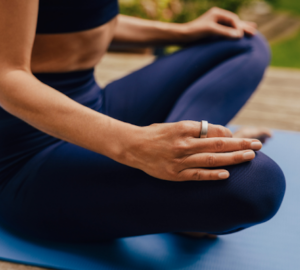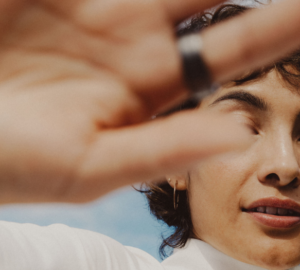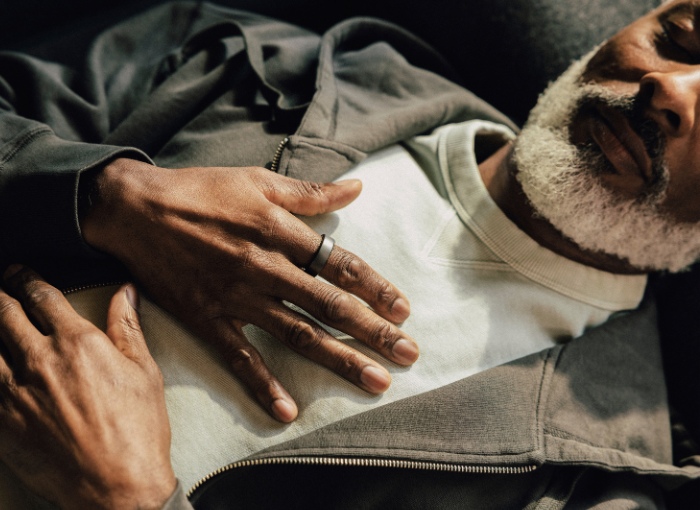- When you’re stressed, the body produces cortisol and adrenaline — hormones that can disrupt your normal circadian rhythm and leave you feeling “wired but tired.”
- Stress has been connected to sleep disruptions such as insomnia, nightmares, and frequent wake-ups during the night.
- Sleep and stress have a bidirectional relationship; in other words, when you reduce stress, you sleep better, and when you sleep better, you reduce stress.
Tossing and turning at night? Your mind might be racing, too. Whether you’re worrying about tomorrow’s meeting or your never-ending to-do list, you’ve probably noticed that stress affects your sleep. In fact, one survey found that 43 percent of people reported that stress caused them to lie awake at night.
To improve sleep, it’s important to target the problem at the source. Stress leads to poor sleep, and poor sleep exacerbates stress. If you’re already caught in this vicious cycle, know there are ways to manage stress to improve sleep. Here’s what you need to know about the sleep-stress connection.
The Sleep-Stress Connection
There’s a bidirectional relationship between sleep and stress. When you’re stressed, physiological and biochemical changes occur in your body and brain. For instance, stress hormones like cortisol and adrenaline are released as part of the body’s fight-or-flight response. This can disrupt your natural circadian rhythm.
“Melatonin has a tendency to kick off as the sun is going down while cortisol (the stress hormone) has a tendency to go down,” says psychologist Michael J. Breus, PhD, known as “The Sleep Doctor. “The problem comes when we’re stressed out.” Stress causes cortisol to continue to flood the brain at night, keeping your body in a fight-or-flight state. This makes it difficult to get into a deeper stage of sleep. As a result, you can become sleep-deprived, triggering a vicious cycle. Sleep deprivation heightens stress, and vice versa.
“When you’re awake longer than your body wants to be, your body will produce cortisol, which is the hormone that is [released] in response to our sympathetic nervous system,” explains Breus.
Being in a state of stress interferes with your ability to fall asleep, stay asleep, and experience restorative deep sleep. It also disrupts the normal progression of sleep stages, particularly REM sleep.
LEARN MORE: Tired but Can’t Sleep? Here Are 5 Possible Reasons Why
The Role of REM Sleep
REM (rapid eye movement) sleep occurs about 90 minutes after you fall asleep. During this cycle of sleep, your brain is active. In fact, your brain activity in REM sleep mirrors how it looks while you’re awake. It should come as no surprise that this is the stage where most dreaming takes place. REM sleep is vital for emotional processing and working through stressful events that you experience during the day.
Studies have found that moderate daytime stress can increase the amount of REM sleep you get at night. It’s thought to be an adaptive response – it’s your brain’s way of processing emotions and stressful experiences. However, Breus says that certain behaviors during the day might interfere with how much REM sleep you get.
“Let’s say you’re drinking alcohol that night or caffeine that day. These actually reduce the amount of REM sleep, and therefore you can’t work through the problem because you don’t have enough REM sleep. You wake up the next day and the problem can still be there,” he says.
LEARN MORE: Sweet Dreams: How Dreaming Can Help Regulate Emotions
5 Ways Stress Impacts Sleep
1. It increases the risk of insomnia.
“The number one thing that causes insomnia is stress, so they’re inexplicably connected. Unless you’re using something to physically knock yourself out like a pharmaceutical, alcohol, or cannabis, stress will override almost anything when it comes to sleep,” Breus says. “This causes you to stay awake long after you need to go to sleep.”
2. It can cause nightmares.
You may have heard that cheese causes nightmares, but in reality, the truth is much more simple. Stress can lead to vivid and disturbing dreams, called nightmares. Interestingly, due to the role of REM sleep and emotional processing, nightmares are considered to be a coping mechanism for stress.
3. It makes it hard to fall asleep.
Cortisol and adrenaline keep your mind racing. Even though you may be physically tired, thoughts are still running through your mind, making it difficult to relax and initiate sleep.
| Member Tip: On the Oura App, one of your Sleep Contributors is latency – this is how long it takes you to fall asleep. When you’re in bed awake, it increases latency and decreases your sleep efficiency and overall Sleep Score. |
LEARN MORE: How to Fall Asleep Fast & Improve Sleep Latency
4. It fragments your overall sleep.
Optimal sleep quality is achieved when you seamlessly move through sleep stages. Fragmented sleep is when you wake up during the night at certain points in your sleep stage, causing an incomplete sleep cycle.
| Member Tip: You may see fragmented sleep reflected in your Oura data as low amounts of deep or REM sleep, or frequent wake-ups (shown as white lines in your sleep data) |
5. You might get less sleep overall.
Nightmares, increased latency, and frequent wake-ups all contribute to a shorter sleep duration. Adults should get between 7 to 9 hours of sleep per night. When you consistently get less than this, it will only exacerbate your stress.
Combat Stress to Sleep Better
To work toward getting better sleep during stressful times, Breus suggests the following:
- Manage stress: It’s important to learn what works for you, but science-backed stress management techniques are a good place to start.
Member Tip: Oura’s Explore content contains dozens of meditations and breathwork exercises to help you alleviate stress and unwind for sleep, all with post-session biofeedback to see how your body is responding - Cut off caffeine by 2pm: Caffeine takes eight to ten hours to be completely cleared from your bloodstream. Factor this in when reaching for your afternoon cup of coffee – if you can stop earlier in the day, even better.
- Avoid alcohol: Limit alcoholic drinks to two drinks and stop drinking them three hours before bed. Also, drink two glasses of water per hour while drinking alcohol. “It takes the average human body about one hour to digest one alcoholic beverage, so it’s all about how much and how close to bedtime you drink,” says Breus. Also, alcohol is a diuretic, so replacing alcohol with water keeps you from getting dehydrated, which can affect sleep.
- Exercise earlier in the day: Avoid exercising within 4 hours of bedtime because otherwise, it will cause your core body temperature to be high. “Remember you want your core body temperature low because you sleep better in the cool,” says Breus.
- Maintain a consistent wake schedule: Wake up at the same time every day, including the weekends, based on your chronotype. Your chronotype is the time of day your body is naturally inclined to sleep.
- After you wake up, do these three things right away:
- Take 15 deep breaths (helps kick in the respiratory system).
- Drink 15 ounces of water (you lose almost a liter of water every night from the humidity in your breath).
- Get 15 minutes of direct sunlight (when sunlight hits a cell in your eye called melanopsin, it turns off the melatonin faucet in your brain and helps relieve brain fog).
RELATED: 9 Simple (and Science-Backed!) Ways to Lower Stress




